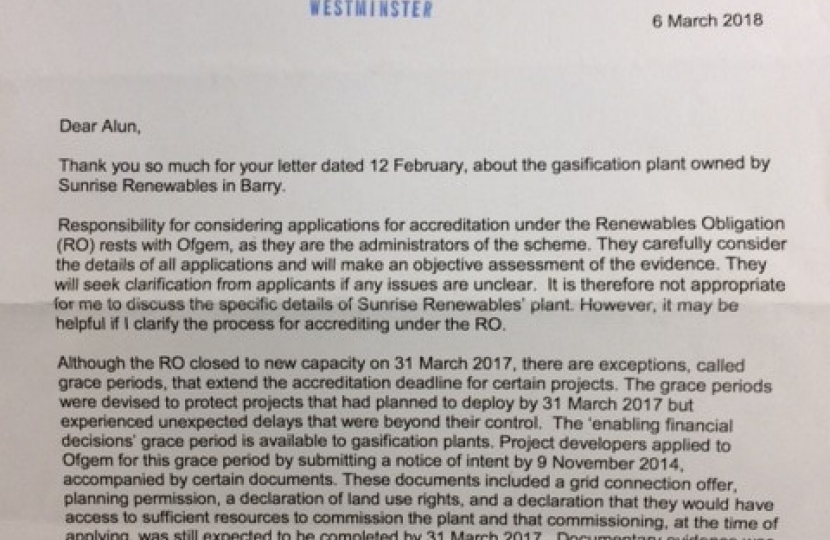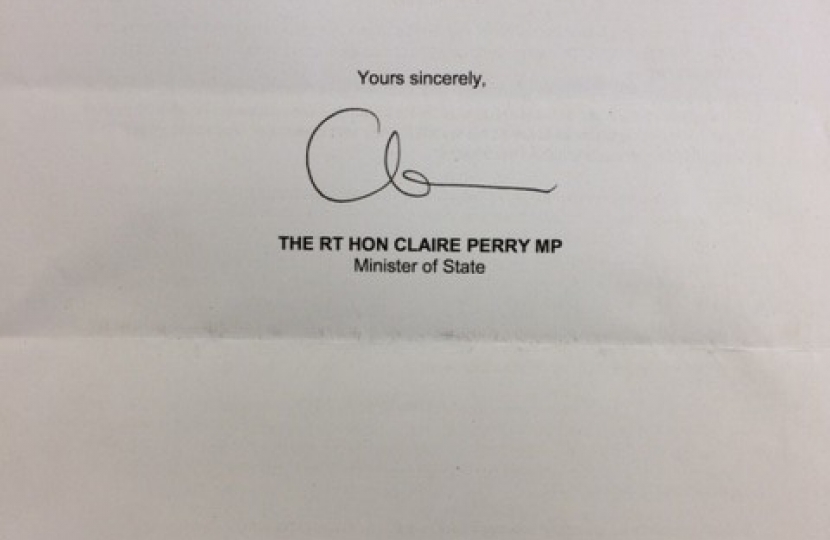In February 2018, I wrote to the Department for Business, Energy and Industrial Strategy regarding the Renewable Obligation Certificate (ROC) subsidy claimed by the Sunrise/Biomass incinerator in Barry, after constituents raised the concern to me.
I asked the Department, on behalf of the group of constituents, why an extension had been granted on the accreditation deadline, whether or not Sunrise Renewables are building parts of the complex without full planning approval and questioned the evidence offered by Sunrise Renewables for their substantial financial decisions and investments made before November 2014.
Here is the response I received from the Minster of State for the Department for Business, Energy and Industrial Strategy, Rt Hon Claire Perry:
Thank you so much for your letter dated 12 February, about the gasification plant owned by Sunrise Renewables in Barry.
Responsibility for considering applications for accreditation under the Renewables Obligation (RO) rests with Ofgem, as they are the administrators of the scheme. They carefully consider the details of all applications and will make an objective assessment of the evidence. They will seek clarification from applicants if any issues are unclear. It is therefore not appropriate for me to discuss the specific details of Sunrise Renewables’ plant. However, it may be helpful if I clarify the process for accrediting under the RO.
Although the RO closed to new capacity on 31 March 2017, there are exceptions, called grace periods, that extend the accreditation deadline for certain projects. The grace periods were divised to protect projects that had planned to deploy by 31 March 2017 but experienced unexpected delays that were beyond their control. The ‘enabling financial decisions’ grace period is available to gasification plants. Project developers applied to Ofgem for this grace period by submitting a notice of intent by 9 November 2014, accompanied by certain documents. These documents included a grid connection offer, planning permission, a declaration of land use rights, and a declaration that they would have access to sufficient resources to commission the plant and that the commissioning, at the time of applying, was still expected to be completed by 31 March 2017. If Ofgem were satisfied with the information provided, the project was allowed until 31 March 2018 to commission and apply for full accreditation under the RO.
Full details of the requirements are set out in Ofgem’s guidance “Renewables Obligation: The ‘enabling financial decisions’ grace period” which is available at:
www.ofgem.gov.uk/publications-and-updates/renewables-obligation-enabling-financial-decisions-grace-period-guidance
Some developers with approval to use a grace period have not needed it and accredited before the 31 March 2017 closure date. However, where a developer has experienced delays and applies to accredit during the grace period, Ofgem will check the details of the application against the notice of intent submitted in 2014. They will investigate any differences. Changes are acceptable, provided that the plant continues to meet all relevant eligibility requirements for accrediting under the RO.
You raised concerns from your constituents that the Sunrise Renewables may be building parts of the plant without full planning approval. Planning authorities can grant permission unconditionally or subject to conditions. Some conditions must be approved by the planning authority before any construction work commences. But those that relate to later stages of the development may be approved after construction has started but before that plant starts generating. If your constituents are concerned that work on the plant is in breach of its planning permission, they should take this up with the local planning authority.
Thank you again for taking the time to write. I hope you find this information useful.
Yours sincerely,
The RT Hon Claire Perry MP
Minster of State

